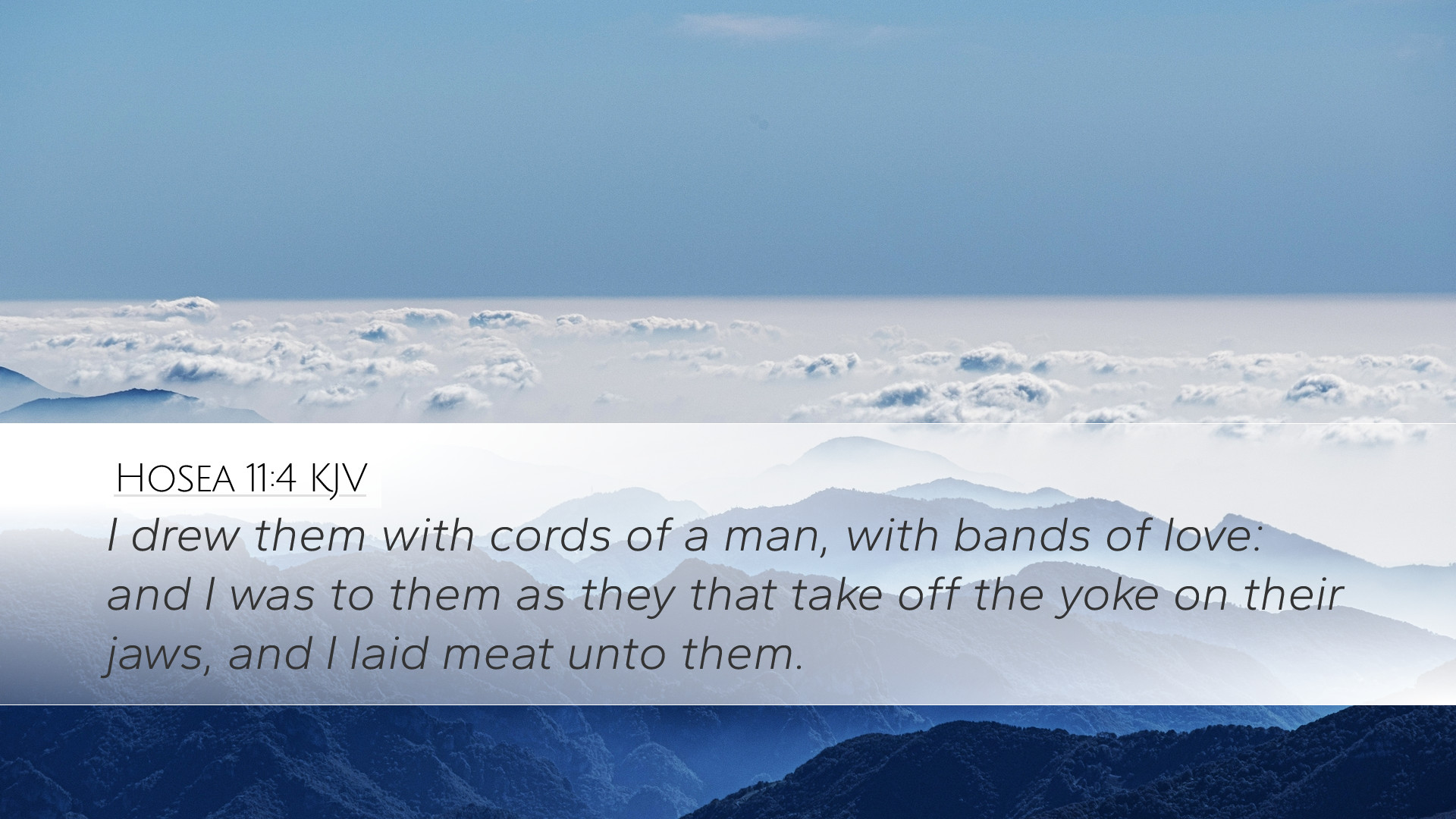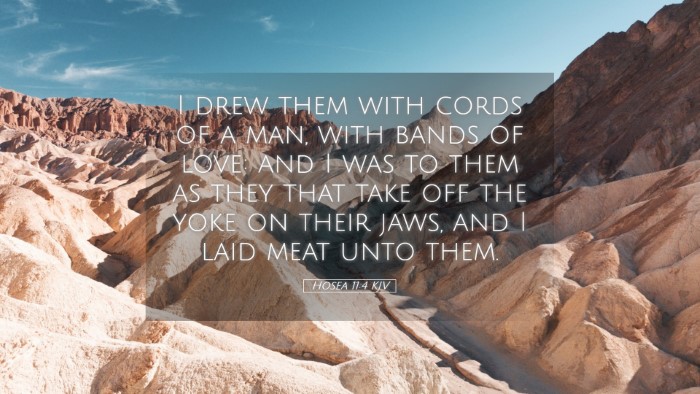Old Testament
Genesis Exodus Leviticus Numbers Deuteronomy Joshua Judges Ruth 1 Samuel 2 Samuel 1 Kings 2 Kings 1 Chronicles 2 Chronicles Ezra Nehemiah Esther Job Psalms Proverbs Ecclesiastes Song of Solomon Isaiah Jeremiah Lamentations Ezekiel Daniel Hosea Joel Amos Obadiah Jonah Micah Nahum Habakkuk Zephaniah Haggai Zechariah MalachiHosea 11:4
Hosea 11:4 KJV
I drew them with cords of a man, with bands of love: and I was to them as they that take off the yoke on their jaws, and I laid meat unto them.
Hosea 11:4 Bible Commentary
Commentary on Hosea 11:4
Hosea 11:4 states: "I drew them with cords of a man, with bands of love: and I was to them as they that take off the yoke on their jaws, and I laid meat unto them." This verse encapsulates God’s compassionate relationship with Israel, highlighting His tenderness and the methodical nature of His call to His people.
Contextual Background
In Hosea's prophetic ministry, Israel is depicted as a wayward child, caught in sin and rebellion against God. Amidst this context of judgment for their transgressions, God's love and mercy are vividly portrayed. Hosea is tasked with conveying God's heart towards His people, even as He disciplines them for their unfaithfulness.
Thematic Analysis
This verse illustrates a profound theme of divine love. The imagery used by Hosea suggests a personal and relational aspect of God’s engagement with Israel. It contrasts God's nurturing approach with the expectations of discipline and judgment that dominate much of the prophetic literature.
God's Personal Approach
- Cords of a man: The phrase "cords of a man" indicates that God’s affection is not coercive but inviting. It reflects the gentleness with which God draws His people, akin to a parent coaxing a child. Matthew Henry notes that this manner of drawing is done with care and love, rather than force.
- Bands of love: The “bands of love” signify not just the ties of affection, but also the responsibilities that love entails. Here, love functions both as a motivating force and as a means of connection—inviting the people to respond to God’s benevolence.
God’s Gentle Deliverance
The metaphor of taking off the yoke suggests liberation from burdens—indicative of God’s desire to alleviate suffering and oppression. Albert Barnes emphasizes this aspect of liberation, correlating it with God’s intent to relieve His people from the weight of sin and its consequences.
God's Sustenance and Provision
The latter part of the verse, “and I laid meat unto them,” signifies God's provision. Adam Clarke states that this reflects how God nurtures His people, supplying their physical and spiritual needs. God’s sustenance represents His continued care even when Israel strays. It is through God’s provision that He hopes to woo back His people, appealing to their dependency on Him.
Theological Implications
This verse provides deep theological insights regarding God’s character and His relentless pursuit of His people. It reveals several layers of understanding about divine love:
- Divine Longing: In spite of Israel's sin, God expresses a longing for relationship, indicating that His love transcends betrayal. The action of “drawing” implies an invitation to experience His grace.
- Freedom vs. Bondage: The removal of the yoke symbolizes not just liberation from external oppressors, but also an internal deliverance from sin. God's love invites nurturing growth instead of mere compliance.
- Compassionate Discipline: God’s love is complemented by His discipline; He is a loving Father who desires correction with the aim of restoration rather than mere punishment.
Pastoral Applications
For pastors and theologians, this verse offers rich pastoral implications. In preaching, it can exemplify God's compassionate nature and serve as a reminder of the relationship believers are invited into:
- Illustrating God's Patience: Much like a shepherd patiently guiding his sheep, pastors are called to embody this tender aspect of God’s character in their ministry.
- Encouraging Empowerment: Churches should embrace the call to draw people towards God with compassion, not coercion, emphasizing the importance of encouragement rather than judgment.
- Offering Nourishment: Just as God provided “meat” for His people, church leaders should prioritize the spiritual nourishment of their congregations through substantive teaching of the Word.
Conclusion
Hosea 11:4 serves as a poignant reminder of God’s enduring love despite human rebellion. It encapsulates the dual aspects of divine grace: drawing near and liberating, all while providing sustenance. As believers reflect on this passage, the call is not just to recognize God’s love, but to respond to it with repentance and a renewed commitment to walk in His ways.


